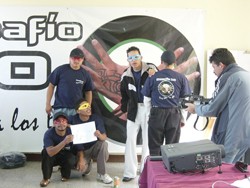
Cameras roll, and the reality show takes off. Would you believe that ten former gangsters from American and Central America rival gangs — White Fence, Mara Salvatrucha, M-18, and North Hollywood — were “making good” on a second chance at life? Welcome to the innovative crime-prevention TV show that USAID and its partners helped produce for Guatemalan television.
The show follows the youths’ journeys out of the gang world and into a new one as productive citizens. The young men divide into two teams, each with a Guatemalan business mentor. Their challenge is to launch a small business in 14 days. Each team receives $3,000 as a start. Film crews captured how they built their businesses over an intense two-week period. Producers edited the scenes into five chapters that aired on prime-time Guatemalan television. One group started a car wash, the other a shoe shine and repair shop.
USAID and its partners invested $15,000 and the private sector pledged in-kind and cash contributions topping $127,496. Motivated by the project’s goal to help Guatemalan youth renege violence, over 15 businesses supported the initiative. At the show’s premier, one of the mentors was moved to tears, commenting “these young men are like sons to me.”
The ground-breaking show, available on USAID partner Creative Associate’s website, generated worldwide media attention. José Garzón, a USAID official, observed, “You hear about a lot of awful things that gangs do, so it’s easy to dehumanize them. But, when you hear a life story of someone who got in and got out, it has a whole new meaning for people.” Gang members are often recruited as children, at age nine or 10, lured by what seems like a safe, close-knit, and family-like dynamic. But once they leave, building a productive life is challenging. Most have few life or work skills and they constantly encounter barriers: police pick up tattooed youth, people shun them, and most businesses refuse to hire anyone with tattoos, a sign of ties to gangs.
At the shoe shine, former gang member Carpenter said, “It was a blessing ... that the U.S. Embassy and the businessmen had confidence in us and supported us.” Painter, who left his gang four years ago, reflected: “Many youth stay in the gangs because they haven’t found people who will help them get a new life.”







Comment
Make a general inquiry or suggest an improvement.